外研社必修二Module5 Newspapers and Magazines Grammar(共53张PPT)
文档属性
| 名称 | 外研社必修二Module5 Newspapers and Magazines Grammar(共53张PPT) |
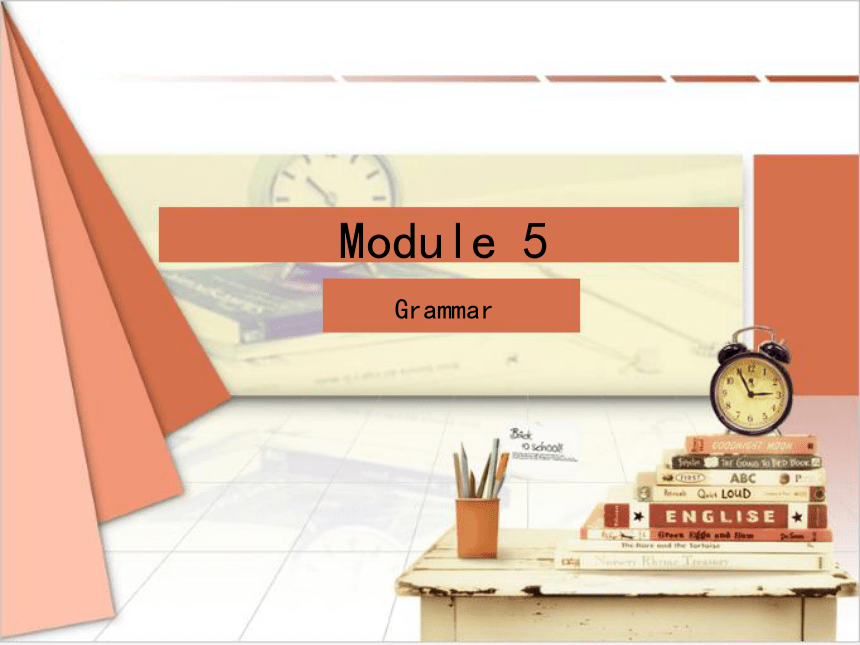
|
|
| 格式 | zip | ||
| 文件大小 | 1.1MB | ||
| 资源类型 | 教案 | ||
| 版本资源 | 外研版 | ||
| 科目 | 英语 | ||
| 更新时间 | 2020-07-16 00:00:00 | ||
图片预览

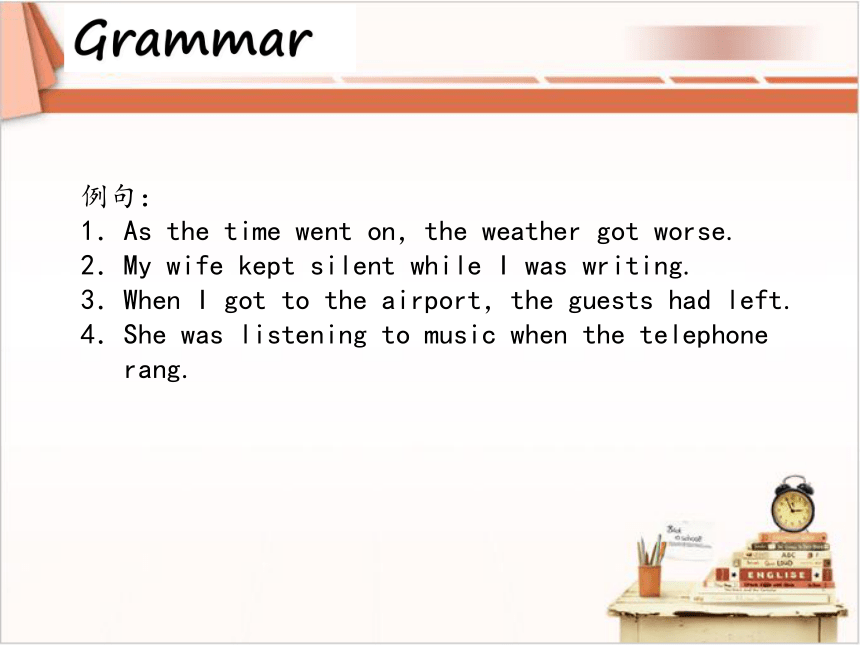
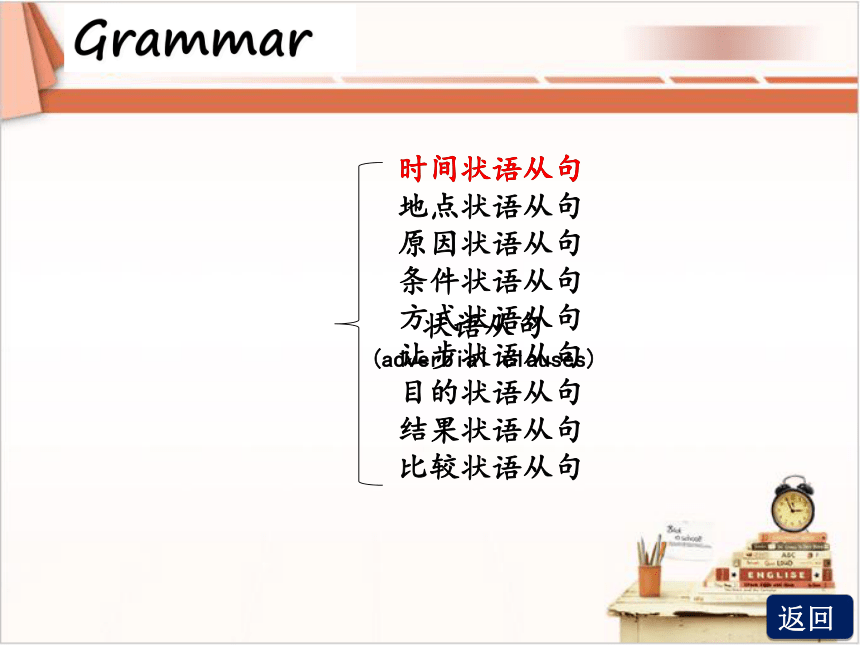
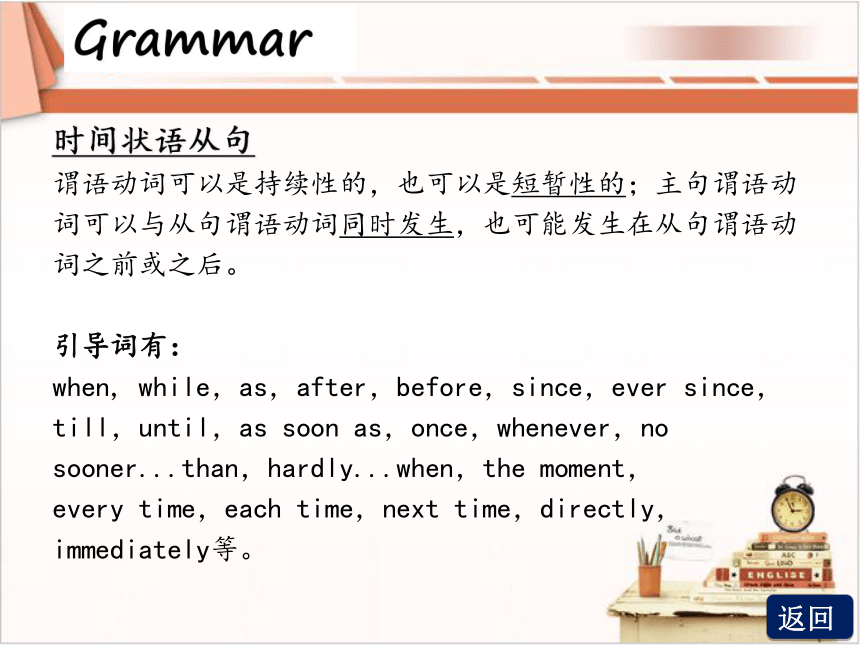
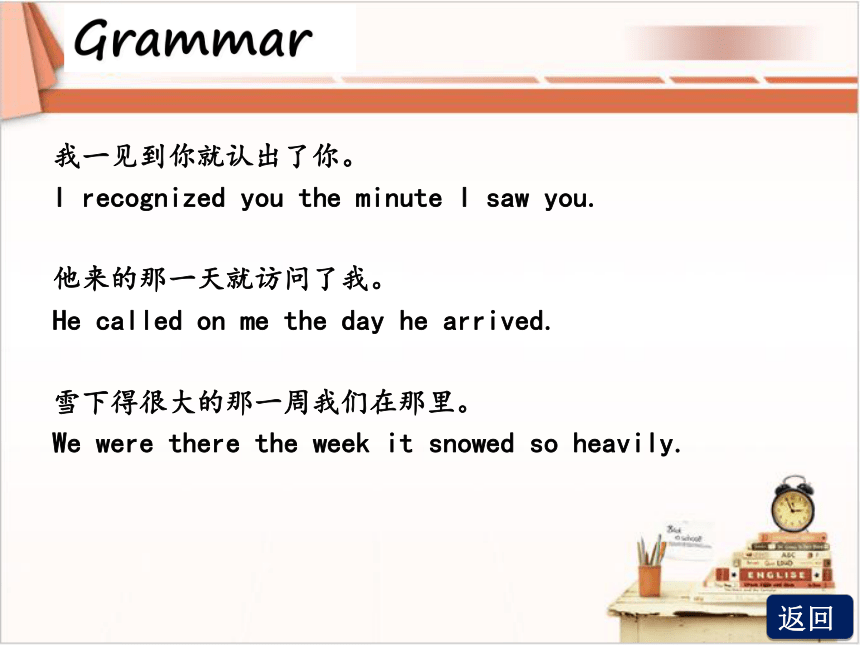
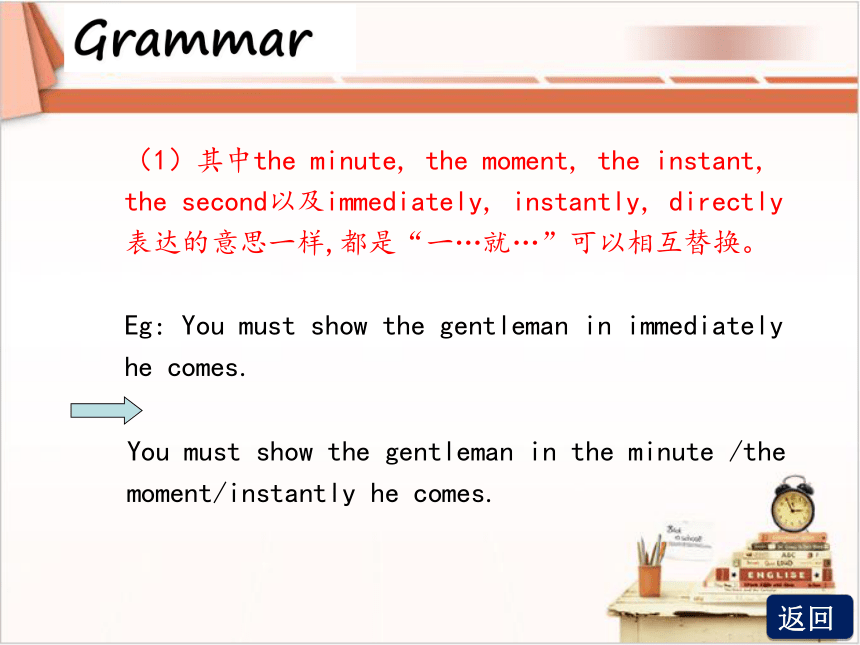
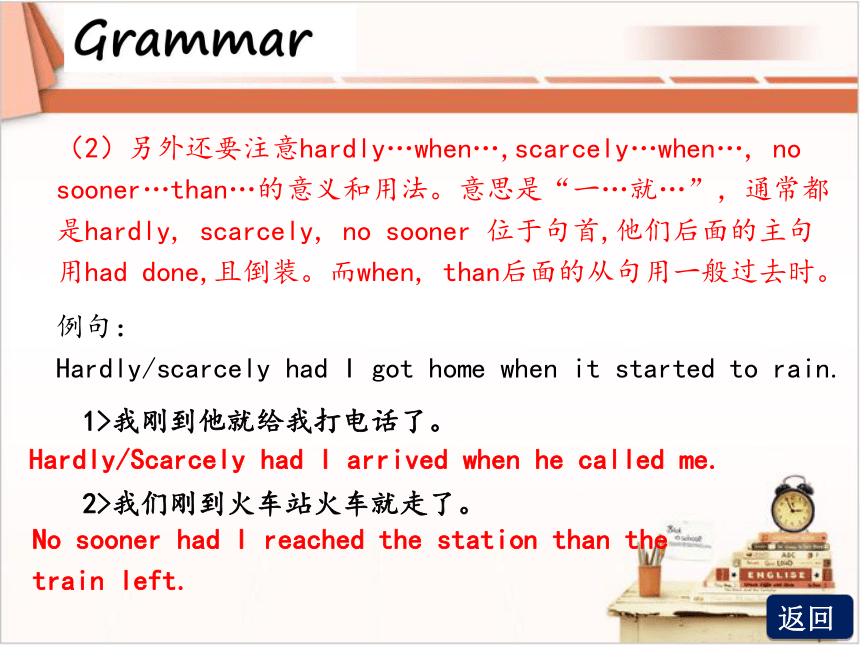
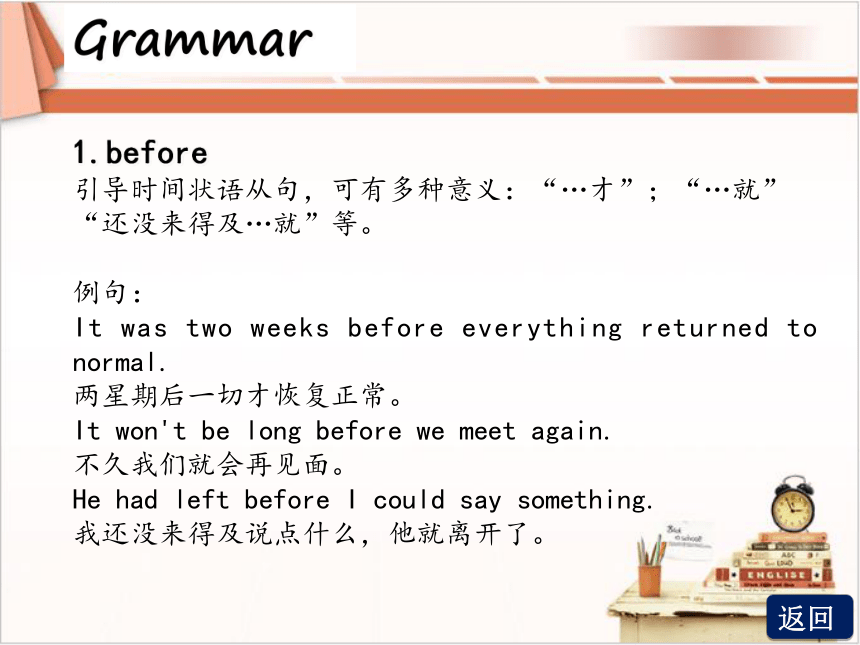
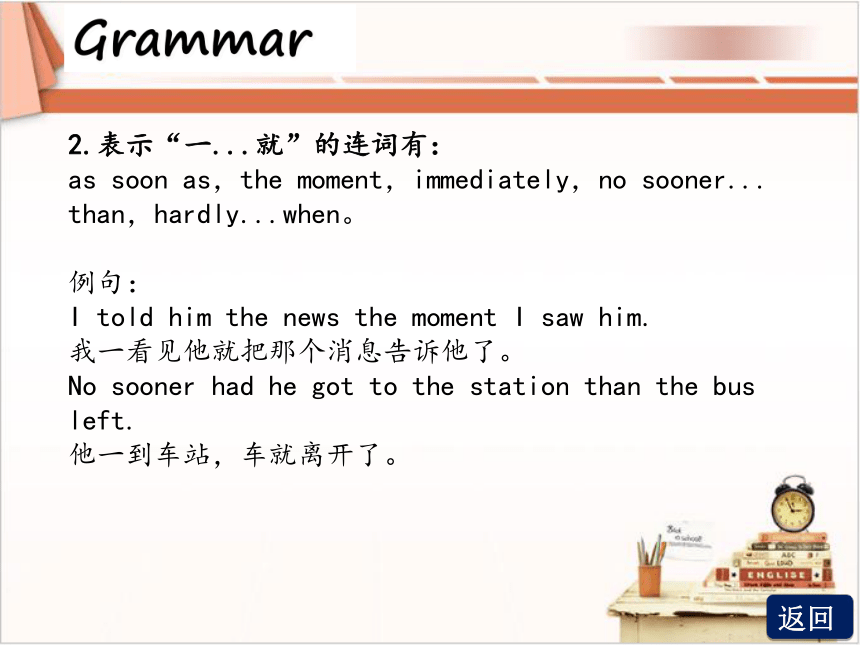
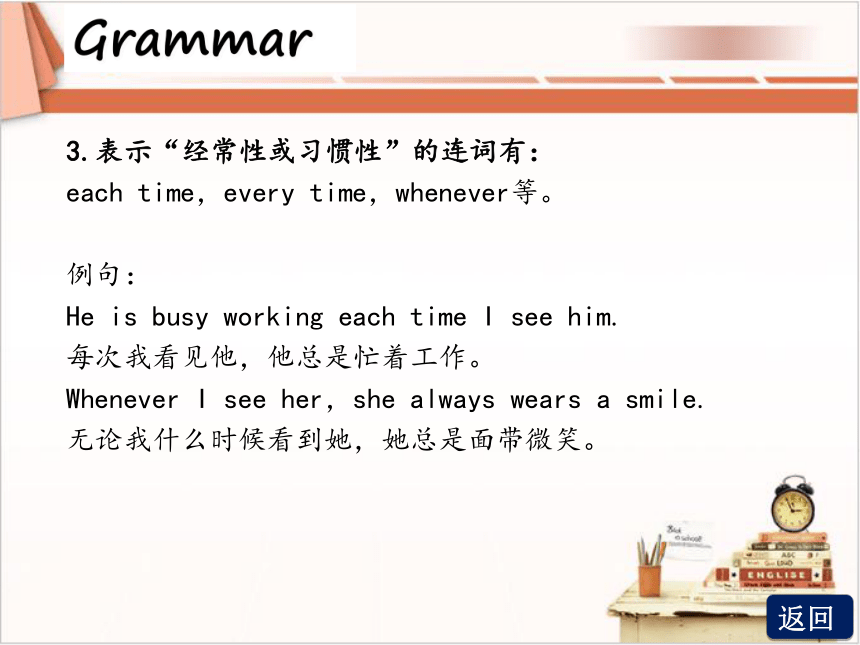
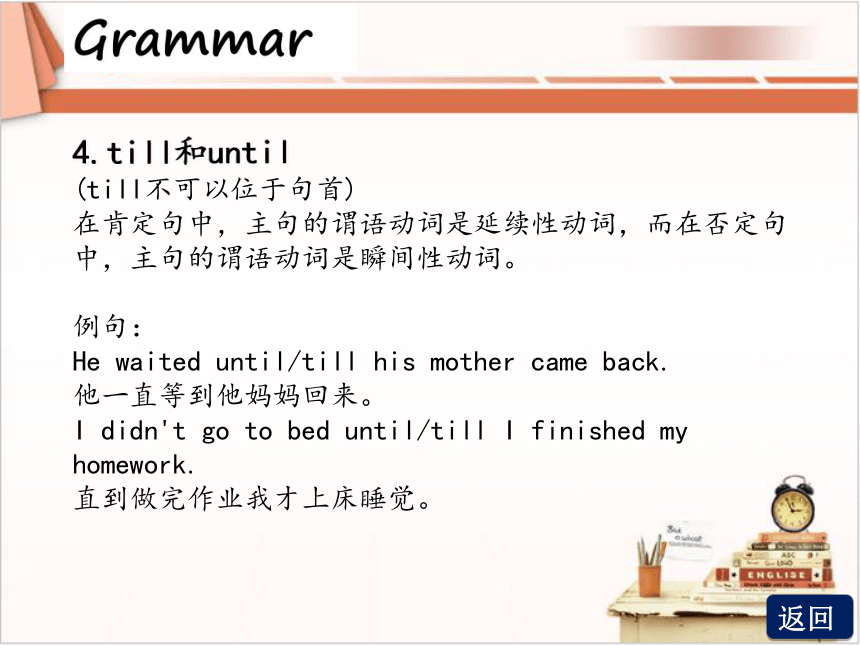
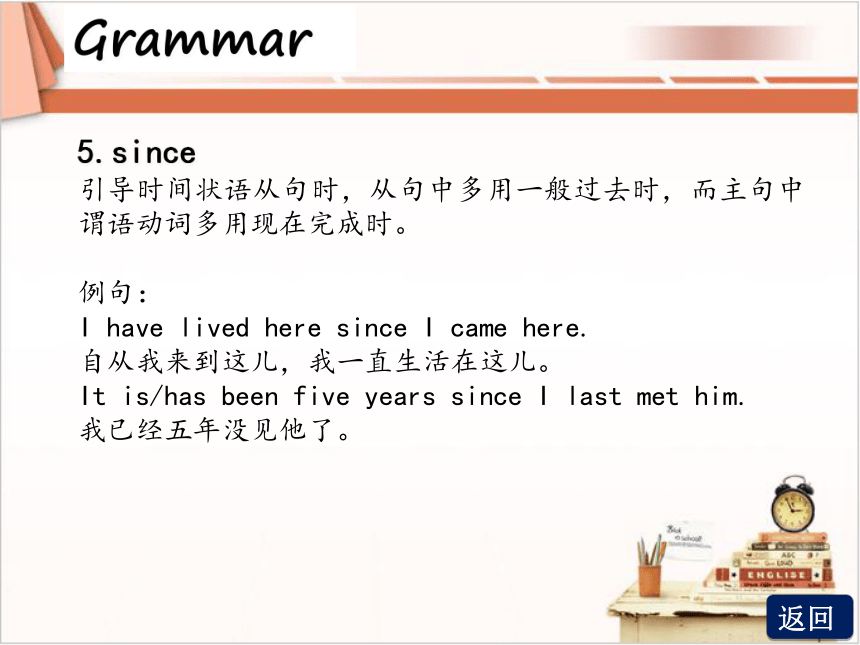
文档简介
(共53张PPT)
Module
5
Grammar
例句:
1.As
the
time
went
on,the
weather
got
worse.
2.My
wife
kept
silent
while
I
was
writing.
3.When
I
got
to
the
airport,the
guests
had
left.
4.She
was
listening
to
music
when
the
telephone
rang.
Grammar
Grammar
状语从句
(adverbial
clauses)
时间状语从句
地点状语从句
原因状语从句
条件状语从句
方式状语从句
让步状语从句
目的状语从句
结果状语从句
比较状语从句
时间状语从句
时间状语从句
谓语动词可以是持续性的,也可以是短暂性的;主句谓语动词可以与从句谓语动词同时发生,也可能发生在从句谓语动词之前或之后。
引导词有:
when,
while,as,after,before,since,ever
since,till,until,as
soon
as,once,whenever,no
sooner...than,hardly...when,the
moment,
every
time,each
time,next
time,directly,immediately等。
Grammar
Grammar
我一见到你就认出了你。
I
recognized
you
the
minute
I
saw
you.
他来的那一天就访问了我。
He
called
on
me
the
day
he
arrived.
雪下得很大的那一周我们在那里。
We
were
there
the
week
it
snowed
so
heavily.
Grammar
(1)其中the
minute,
the
moment,
the
instant,
the
second以及immediately,
instantly,
directly
表达的意思一样,都是“一…就…”可以相互替换。
Eg:
You
must
show
the
gentleman
in
immediately
he
comes.
You
must
show
the
gentleman
in
the
minute
/the
moment/instantly
he
comes.
Grammar
(2)另外还要注意hardly…when…,scarcely…when…,
no
sooner…than…的意义和用法。意思是“一…就…”,通常都是hardly,
scarcely,
no
sooner
位于句首,他们后面的主句用had
done,且倒装。而when,
than后面的从句用一般过去时。
例句:
Hardly/scarcely
had
I
got
home
when
it
started
to
rain.
1>我刚到他就给我打电话了。
2>我们刚到火车站火车就走了。
Hardly/Scarcely
had
I
arrived
when
he
called
me.
No
sooner
had
I
reached
the
station
than
the
train
left.
Grammar
1.before
引导时间状语从句,可有多种意义:“…才”;“…就”
“还没来得及…就”等。
例句:
It
was
two
weeks
before
everything
returned
to
normal.
两星期后一切才恢复正常。
It
won't
be
long
before
we
meet
again.
不久我们就会再见面。
He
had
left
before
I
could
say
something.
我还没来得及说点什么,他就离开了。
Grammar
2.表示“一...就”的连词有:
as
soon
as,the
moment,immediately,no
sooner...
than,hardly...when。
例句:
I
told
him
the
news
the
moment
I
saw
him.
我一看见他就把那个消息告诉他了。
No
sooner
had
he
got
to
the
station
than
the
bus
left.
他一到车站,车就离开了。
Grammar
3.表示“经常性或习惯性”的连词有:
each
time,every
time,whenever等。
例句:
He
is
busy
working
each
time
I
see
him.
每次我看见他,他总是忙着工作。
Whenever
I
see
her,she
always
wears
a
smile.
无论我什么时候看到她,她总是面带微笑。
Grammar
4.till和until
(till不可以位于句首)
在肯定句中,主句的谓语动词是延续性动词,而在否定句中,主句的谓语动词是瞬间性动词。
例句:
He
waited
until/till
his
mother
came
back.
他一直等到他妈妈回来。
I
didn't
go
to
bed
until/till
I
finished
my
homework.
直到做完作业我才上床睡觉。
Grammar
5.since
引导时间状语从句时,从句中多用一般过去时,而主句中谓语动词多用现在完成时。
例句:
I
have
lived
here
since
I
came
here.
自从我来到这儿,我一直生活在这儿。
It
is/has
been
five
years
since
I
last
met
him.
我已经五年没见他了。
【提示】
时间状语从句中常用一般现在时表示将来;当从句的动作先于主句的动作发生时,则用现在完成时表示将来。
例句:
When
I
come
back,I'll
go
to
see
my
parents.
我回来时要去看望父母。
You
can't
go
out
to
play
until
you
have
finished
your
homework.
做完作业你才能出去玩。
Grammar
when/while/as引导时间状语从句时的区别:
1.作为“当…时”讲,when可以和延续性动词连用,也可以和短暂性动词连用,而while和as只能和延续性动词连用。
Grammar
eg:
Why
do
you
want
a
new
job
when
you’ve
got
such
a
good
one?
Sorry,
I
was
out
when
you
called
me.
Strike
while
the
iron
is
hot.
The
students
took
notes
as
they
listened.
get
为短暂性动词
call为短暂性动词
is为延续性动词
listen
为延续性动词
2.when从句的谓语动词可以在主句动词之前或之后发生或同时发生。while引导的从句强调主句和从句的动作同时发生(或者相对应)。
例如:
When
he
had
finished
his
homework,
he
took
a
rest.
When
I
got
to
the
airport,
the
guests
had
left.
也就是说当主从句动作同时发生,且从句动作为延续性动词时,
三者可互换。
例句:
When/While/As
she
was
making
a
phone
call,
I
was
writing
a
letter.
Grammar
had
finished
先发生
got
to
后发生
Grammar
while有时还做并列连词“然而”表对比和从属连词
“尽管”的意思,
相当与though/although。
While
my
wife
was
reading
the
newspaper,I
was
watching
TV.
(read
是延续性的动词,was
reading和was
watching同时发生)当我妻子看报纸的时候,我正在看电视。
I
like
playing
football
while
you
like
playing
basketball.
我喜欢踢足球,而你喜欢打篮球。
Grammar
when有时表示“就在那时”通常用在以下句型中
be
about
to
do…when…
had
done…when…
be
doing…when…
be
on
the
point
of
doing…when…
例如:
When
she
came
in,I
stopped
eating.
她进来时,我才刚吃完饭。
我正打算出去这时电话响
我正在读书这时有人敲门。
I
was
about
to
go
out
when
the
phone
rang.
I
was
on
the
point
of
reading
books
when
someone
knocked
at
the
door.
3.as表示“在……的同时,一边……一边”,as引导的动作是延续性的,一般用于主句和从句动作同时发生时;as也可以强调一先一后;as还可译为“随着”。
例如:
We
always
sing
as
we
walk.
我们总是边走边唱。
As
we
were
going
out,it
began
to
rain.
当我们出门时,天开始下雨了。(as强调句中两个动作紧接着先后发生,而不强调开始下雨的特定时间。)
As
time
went
on,he
grew
weaker
and
weaker.
随着时间的流逝,他身体越来越弱了。
Grammar
4.
在将来时的从句中常用when,
且从句必须用一般现在时
You
shall
borrow
the
book
when
I
have
finished
reading
it.
5.
when还用在表示“一…就…”的句型中。
Hardly/Scarcely
had
I
entered
my
room
when
the
telephone
rang.
Grammar
1.
–Was
his
father
strict
with
him
when
he
was
at
school?
-
Yes.
He
had
never
praised
him_____
he
became
one
of
top
students
in
his
grade.
A.
after
B.
unless
C.
until
D.
when
2.
____
you
told
me,
I
had
no
idea
of
it.
A.
Until
B.
When
C.
While
D.
As
√
√
Practice
3.
It
was
foolish
of
you
to
take
a
taxi____
you
could
easily
walk
there
in
5
minutes.
A.
before
B.
till
C.
so
that
D.
when.
4.
the
day
goes
on,the
weather
gets
colder
and
colder.
A.With B.Since
C.While
D.As
解析:选D。as引导时间状语从句“随着”。
√
Practice
5.________
Tom
was
reading
the
newspaper,his
sister
was
watching
TV.
A.When
B.While
C.With
D.As
解析:选B。while引导时间状语从句,强调主句和从句的动作同时发生,而且谓语动词是延续性的。
6.Mary
likes
pop
music
________Jack
likes
folk
music.
A.when
B.while
C.with
D.as
解析:选B。while
表示对比。
Practice
7.(江西卷)Please
call
my
secretary
to
arrange
a
meeting
this
afternoon,or
it
is
convenient
to
you.
A.whenever
B.however
C.whichever
D.wherever
解析:选A。句意:请打电话让我的秘书安排一个会议,在今天下午或是任何你方便的时候。whenever无论何时;however无论如何;whichever无论哪一个;wherever无论何地。此处or连接的是和this
afternoon并列的两个时间状语(从句),故只有A项正确。
Practice
Practice
8.He
had
run
away
I
could
tell
him
something
about
his
examination.
A.before
B.until
C.since
D.when
【解析】 句意:我还没来得及告诉他关于他考试的事情,他就跑了。before引导时间状语从句,意为:还没来得及……就……。
【答案】 A
Practice
9.Because
of
the
heavy
traffic,it
was
already
time
for
lunch
break
she
got
to
her
office.
A.since
B.that
C.when
D.until
【解析】 考查状语从句。句意:因为交通阻塞,当她到达办公室时已经是午休的时间了。故此处应为when引导的时间状语从句,故正确答案为C。
【答案】 C
Practice
10.The
head
of
the
company
promised
to
deal
with
matters
of
this
sort
he
returned
to
his
office.
A.until
B.while
C.by
the
time
D.the
moment
【解析】 句意:公司的领导答应他一回到办公室就解决这类问题。
the
moment意为“一……就……”。
【答案】 D
Practice
11.He
looked
at
the
plane
taking
off
it
disappeared.
A.when
B.after
C.until
D.since
【解析】 句意:他看着飞机起飞,直到它消失了。只有until符合题意,故选C。
【答案】 C
Practice
12.(陕西高考)I
have
heard
a
lot
of
good
things
about
you
I
came
back
from
abroad.
A.since B.until
C.before
D.when
【解析】 考查状语从句。根据句意及主从句时态即可判断为A项,因为since从句用一般过去时,主句用现在完成时。句意:自从我从国外回来,我已经听说了关于你的许多好的事情。
【答案】 A
Practice
13.—How
long
do
you
think
it
is
he
arrived
here?
—No
more
than
half
a
year,I
believe.
A.when
B.that
C.before
D.since
【解析】 考查It
is+时间段+since从句。问句句意:你认为他来这儿多长时间了?
【答案】 D
Grammar
用when,as,while
填空
1.I
was
cooking
________I
heard
her
knocking
at
the
door.
答案:when
2.He
fell
asleep
________he
was
reading
the
newspaper.
答案:while
3.The
students
took
notes
________they
listened.
答案:as
4.________
I
was
walking
down
the
street,I
noticed
a
police
car
in
front
of
the
bank.
答案:When/While
5.________
the
time
went
on,she
got
better.
答案:As
Practice
Grammar
例句:
1.—Why
were
you
absent?
—Because
I
was
ill.
2.Since
he
can’t
come,I
have
to
ask
someone
else
to
help
me.
3.As
he
was
not
well,I
decided
to
go
alone.
4.Now
that
you
are
free
today,you
may
have
a
rest
at
home.
Grammar
Grammar
状语从句
(adverbial
clauses)
时间状语从句
地点状语从句
原因状语从句
条件状语从句
方式状语从句
让步状语从句
目的状语从句
结果状语从句
比较状语从句
原因状语从句
原因状语从句
引导词可能是单个的单词,也可能是由多个单词组成的连词;原因状语从句大都放在句首,有时也放在句末。
引导词或词组
because,since,as,now
that等
Grammar
常见的用法主要有:
1.because“因为,由于”,在引导原因状语从句的连词中,because的语气是最强的,表示主句谓语动词的直接原因,常用来回答以why开头的疑问句。
例如:
1.
The
boy
was
absent
because
he
was
ill.
那个男孩因病缺席。
2.
—Why
can’t
you
go
there
now?
—你现在为什么不能去那里?
—Because
I’m
too
busy.
—因为我太忙了。
Grammar
2.as“因为,由于”,如果原因很明显或估计对方是知道的,从句用as引导时较多;有时有“既然”的意思。
例如:
As
I
have
not
read
the
book,I
cannot
tell
you
anything
about
it.
由于我没有读过这本书,所以无法告诉你有关它的事情。
She
stayed
at
home
as
she
had
no
car.
她因没有汽车而待在家里。
As
you
are
sorry,I’ll
forgive
you.
既然你已感到抱歉,那我就原谅你吧。
Grammar
3.since“因为,既然”,它引导的从句通常放在句首,常表示已为人们所知的原因或理由。
例如:
Since
it
is
late,I
shall
go
home
now.
由于时间晚了,我现在要回家了。
Since
you
are
so
sure
of
it,he’ll
believe
you.
既然你对此这么有把握,他会相信你的。
Grammar
4.now
that“既然,由于”,与since表示的意思相似,与
since不同的是,now
that有“时间”含义,常用于有新情况发生的时候。
例如:
Now
that
the
rain
has
stopped,let’s
go
home
at
once.
既然雨已停了,让我们立刻回家吧。
Now
that
they
are
all
gone,you
can
tell
me
the
secret.
既然他们都走了,你可以告诉我这个秘密了。
而下面这句话就只能用
since,不能用
now
that:
Since
no
one
has
read
the
book,we
can’t
discuss
it.
既然没人读过这本书,我们就不能对它进行讨论。
Grammar
Grammar
5.形容词glad,sorry,afraid,pleased,satisfied,proud,delighted,也可以接一个有that引导的原因状语从句,
且that可省略。
⑴
我很高兴你把这见事告诉了我。
⑵
对不起,我没有做我该做的那么多。
⑶
恐怕他考试不及格了。
⑷
我们很自豪我们的国家越来越壮大。
I’m
glad
(that)
you
told
me
about
it.
I’m
sorry
(that)
I
haven’t
done
so
much
as
I
should.
I’m
afraid
(that)
he
hasn’t
passed
the
exam.
We
feel
proud
(that)
our
country
is
getting
stronger.
Grammar
6.原因状语从句中应注意的问题
as,
because,
for,
since
的区别
1>
as作为从属连词引导原因状语从句时,语气不如because
强烈。它引导的从句常放在句首,
说明原因,后面的主句
则说明结果。
2>
because
引导从句时,
语气最强,
直接回答why的问句,
引导的句子是语意中心所在,
一般在句后。
3>
for作为并列连词,多用于书面语中,表示原因,
语气最弱,
往往含对所作论述提供情况或补充说明之意。它引导
的句子一般在主句之后。
4>
它表示的原因是双方已知道的。
now
that(=since)是一个连词词组,作“既然”讲,引导原因状语从句。语气较弱,强调人们已知的事实。在口语中that常可省略,而只有now连接从句。because比now
that与since表示的原因更直接
用法
语气
意义
now
that
引导原因状语从句
较弱
表示显而易见,既成事实的原因,与since同义,但更突出事实本身,可翻译为“既然”。
since
较弱
强调已知的事实,一般放在主句前。
because
强
表示直接而明确的原因和理由,可以回答why的提问。
as
较弱
表示的是不言而喻、显而易见的原因和理由,其从句一般放在主句前。
for
连接并列句
较弱
表示对主句进一步解释说明,附加或推断的理由。
1.________I’ve
got
my
own
car,I
don’t
get
as
much
exercise
as
I
used
to.
A.Even
if
B.Except
that
C.Now
that
D.Until
解析:选C。now
that
既然,由于,句意:既然我有我自己的车,我就不再像过去那样锻炼了
2.Some
of
his
suggestions
were
rejected
_____they
were
impractical(不切实际的).
A.because
B.unless
C.though
D.so
that
解析:选A。句意:他的一些建议被拒绝了,
因为他们不切实际。because引导原因状语从句
Practice
3.—Why
can’t
I
go?
—________
you’re
too
young.
A.For
B.Because
C.As
D.Since
解析:选B。回答why
提出的问题需要because。
4.________I
haven’t
seen
the
film,I
know
very
little
about
it.
A.After
B.Although
C.As
D.Before
解析:选C。根据句意:由于我没有看这部电
影,我知道的很少。
Practice
5.It
is
ten
years
________he
smoked.
A.that
B.when
C.since
D.while
解析:选C。since“自从”常用于“It
is+...since...”
结构中表示“自从……以来……”。
Practice
Practice
6.
I've
got
my
own
car,I
don't
get
as
much
exercise
as
I
used
to.
A.Even
if
B.Except
that
C.Now
that
D.Until
【解析】 句意:因为我有了自己的车,我锻炼身体不如以前多了。even
if意为“即使”;except
that意为“除了”;now
that意为“既然”;until意为“直到……”。只有now
that可以引导原因状语从句,故C项正确。
【答案】 C
Practice
7.
you'
ve
got
a
chance,you
might
as
well
make
full
use
of
it.
A.After
B.While
C.As
soon
as
D.Now
that
【解析】 考查状语从句的连接词。句意:既然你已经得到了一个机会,你还是好好利用它吧。after在……之后;while尽管;as
soon
as一……就……;now
that既然。故选D。
【答案】 D
Practice
8.Parents
should
take
their
children's
requests
for
sunglasses
seriously
eye
protection
is
necessary
in
sunny
weather.
A.because
B.though
C.unless
D.if
【解析】 句意:父母应认真对待孩子要求要太阳镜的事情,因为晴天保护眼睛是必要的。because引导原因状语从句。
【答案】 A
Practice
9.
He
found
it
increasingly
difficult
to
read,
_____
his
eyesight
was
beginning
to
fail.
A.
though
B.
for
C.
but
D.
so
10.
—Did
you
return
Fred’s
call?
—I
didn’t
need
to
_____
I’ll
see
him
tomorrow.
A.
though
B.
unless
C.
when
D.
because
11.
I
hope
you’ve
got
your
own
car,
_____
if
you
haven’t
we
may
have
to
hire
one.
A.
because
B.
so
that
C.
ever
since
D.
when
Practice
12.
I
hope
you’ve
got
your
own
car,
_____
if
you
haven’t
we
may
have
to
hire
one.
A.
because
B.
so
that
C.
ever
since
D.
when
14.
Animals
suffered
at
the
hands
of
Man
_____
they
were
destroyed
by
people
to
make
way
for
agricultural
land
to
provide
food
for
more
people.
A.
in
which
B.
for
which
C.
so
that
D.
in
that
13.
Jenny
was
very
sad
over
the
loss
of
the
photos
she
had
shot
at
Canada,
_____
this
was
a
memory
she
especially
treasured.
A.
as
B.
if
C.
when
D.
where
用because,as,since,now
that或for填空
1.I
didn’t
go,________I
was
afraid.
答案:because
2.________
the
weather
is
so
bad,we
have
to
delay
our
journey.
答案:As/Since
3.He
must
be
ill,________he
is
absent
today.
答案:for
4.—Why
can’t
I
go?
—________you’re
not
old
enough.
答案:Because
Practice
5.It
was
________she
was
seriously
ill
that
she
didn’t
come
to
the
lecture
yesterday.
答案:because
6.________
Jane
was
the
eldest,she
looked
after
the
others.
答案:As
7.________
you
know
it,I
won’t
repeat
it.
答案:Since
8.____________
everybody
is
here,let’s
begin
the
discussion.
答案:Now
that
Practice
Grammar
Module
5
Grammar
例句:
1.As
the
time
went
on,the
weather
got
worse.
2.My
wife
kept
silent
while
I
was
writing.
3.When
I
got
to
the
airport,the
guests
had
left.
4.She
was
listening
to
music
when
the
telephone
rang.
Grammar
Grammar
状语从句
(adverbial
clauses)
时间状语从句
地点状语从句
原因状语从句
条件状语从句
方式状语从句
让步状语从句
目的状语从句
结果状语从句
比较状语从句
时间状语从句
时间状语从句
谓语动词可以是持续性的,也可以是短暂性的;主句谓语动词可以与从句谓语动词同时发生,也可能发生在从句谓语动词之前或之后。
引导词有:
when,
while,as,after,before,since,ever
since,till,until,as
soon
as,once,whenever,no
sooner...than,hardly...when,the
moment,
every
time,each
time,next
time,directly,immediately等。
Grammar
Grammar
我一见到你就认出了你。
I
recognized
you
the
minute
I
saw
you.
他来的那一天就访问了我。
He
called
on
me
the
day
he
arrived.
雪下得很大的那一周我们在那里。
We
were
there
the
week
it
snowed
so
heavily.
Grammar
(1)其中the
minute,
the
moment,
the
instant,
the
second以及immediately,
instantly,
directly
表达的意思一样,都是“一…就…”可以相互替换。
Eg:
You
must
show
the
gentleman
in
immediately
he
comes.
You
must
show
the
gentleman
in
the
minute
/the
moment/instantly
he
comes.
Grammar
(2)另外还要注意hardly…when…,scarcely…when…,
no
sooner…than…的意义和用法。意思是“一…就…”,通常都是hardly,
scarcely,
no
sooner
位于句首,他们后面的主句用had
done,且倒装。而when,
than后面的从句用一般过去时。
例句:
Hardly/scarcely
had
I
got
home
when
it
started
to
rain.
1>我刚到他就给我打电话了。
2>我们刚到火车站火车就走了。
Hardly/Scarcely
had
I
arrived
when
he
called
me.
No
sooner
had
I
reached
the
station
than
the
train
left.
Grammar
1.before
引导时间状语从句,可有多种意义:“…才”;“…就”
“还没来得及…就”等。
例句:
It
was
two
weeks
before
everything
returned
to
normal.
两星期后一切才恢复正常。
It
won't
be
long
before
we
meet
again.
不久我们就会再见面。
He
had
left
before
I
could
say
something.
我还没来得及说点什么,他就离开了。
Grammar
2.表示“一...就”的连词有:
as
soon
as,the
moment,immediately,no
sooner...
than,hardly...when。
例句:
I
told
him
the
news
the
moment
I
saw
him.
我一看见他就把那个消息告诉他了。
No
sooner
had
he
got
to
the
station
than
the
bus
left.
他一到车站,车就离开了。
Grammar
3.表示“经常性或习惯性”的连词有:
each
time,every
time,whenever等。
例句:
He
is
busy
working
each
time
I
see
him.
每次我看见他,他总是忙着工作。
Whenever
I
see
her,she
always
wears
a
smile.
无论我什么时候看到她,她总是面带微笑。
Grammar
4.till和until
(till不可以位于句首)
在肯定句中,主句的谓语动词是延续性动词,而在否定句中,主句的谓语动词是瞬间性动词。
例句:
He
waited
until/till
his
mother
came
back.
他一直等到他妈妈回来。
I
didn't
go
to
bed
until/till
I
finished
my
homework.
直到做完作业我才上床睡觉。
Grammar
5.since
引导时间状语从句时,从句中多用一般过去时,而主句中谓语动词多用现在完成时。
例句:
I
have
lived
here
since
I
came
here.
自从我来到这儿,我一直生活在这儿。
It
is/has
been
five
years
since
I
last
met
him.
我已经五年没见他了。
【提示】
时间状语从句中常用一般现在时表示将来;当从句的动作先于主句的动作发生时,则用现在完成时表示将来。
例句:
When
I
come
back,I'll
go
to
see
my
parents.
我回来时要去看望父母。
You
can't
go
out
to
play
until
you
have
finished
your
homework.
做完作业你才能出去玩。
Grammar
when/while/as引导时间状语从句时的区别:
1.作为“当…时”讲,when可以和延续性动词连用,也可以和短暂性动词连用,而while和as只能和延续性动词连用。
Grammar
eg:
Why
do
you
want
a
new
job
when
you’ve
got
such
a
good
one?
Sorry,
I
was
out
when
you
called
me.
Strike
while
the
iron
is
hot.
The
students
took
notes
as
they
listened.
get
为短暂性动词
call为短暂性动词
is为延续性动词
listen
为延续性动词
2.when从句的谓语动词可以在主句动词之前或之后发生或同时发生。while引导的从句强调主句和从句的动作同时发生(或者相对应)。
例如:
When
he
had
finished
his
homework,
he
took
a
rest.
When
I
got
to
the
airport,
the
guests
had
left.
也就是说当主从句动作同时发生,且从句动作为延续性动词时,
三者可互换。
例句:
When/While/As
she
was
making
a
phone
call,
I
was
writing
a
letter.
Grammar
had
finished
先发生
got
to
后发生
Grammar
while有时还做并列连词“然而”表对比和从属连词
“尽管”的意思,
相当与though/although。
While
my
wife
was
reading
the
newspaper,I
was
watching
TV.
(read
是延续性的动词,was
reading和was
watching同时发生)当我妻子看报纸的时候,我正在看电视。
I
like
playing
football
while
you
like
playing
basketball.
我喜欢踢足球,而你喜欢打篮球。
Grammar
when有时表示“就在那时”通常用在以下句型中
be
about
to
do…when…
had
done…when…
be
doing…when…
be
on
the
point
of
doing…when…
例如:
When
she
came
in,I
stopped
eating.
她进来时,我才刚吃完饭。
我正打算出去这时电话响
我正在读书这时有人敲门。
I
was
about
to
go
out
when
the
phone
rang.
I
was
on
the
point
of
reading
books
when
someone
knocked
at
the
door.
3.as表示“在……的同时,一边……一边”,as引导的动作是延续性的,一般用于主句和从句动作同时发生时;as也可以强调一先一后;as还可译为“随着”。
例如:
We
always
sing
as
we
walk.
我们总是边走边唱。
As
we
were
going
out,it
began
to
rain.
当我们出门时,天开始下雨了。(as强调句中两个动作紧接着先后发生,而不强调开始下雨的特定时间。)
As
time
went
on,he
grew
weaker
and
weaker.
随着时间的流逝,他身体越来越弱了。
Grammar
4.
在将来时的从句中常用when,
且从句必须用一般现在时
You
shall
borrow
the
book
when
I
have
finished
reading
it.
5.
when还用在表示“一…就…”的句型中。
Hardly/Scarcely
had
I
entered
my
room
when
the
telephone
rang.
Grammar
1.
–Was
his
father
strict
with
him
when
he
was
at
school?
-
Yes.
He
had
never
praised
him_____
he
became
one
of
top
students
in
his
grade.
A.
after
B.
unless
C.
until
D.
when
2.
____
you
told
me,
I
had
no
idea
of
it.
A.
Until
B.
When
C.
While
D.
As
√
√
Practice
3.
It
was
foolish
of
you
to
take
a
taxi____
you
could
easily
walk
there
in
5
minutes.
A.
before
B.
till
C.
so
that
D.
when.
4.
the
day
goes
on,the
weather
gets
colder
and
colder.
A.With B.Since
C.While
D.As
解析:选D。as引导时间状语从句“随着”。
√
Practice
5.________
Tom
was
reading
the
newspaper,his
sister
was
watching
TV.
A.When
B.While
C.With
D.As
解析:选B。while引导时间状语从句,强调主句和从句的动作同时发生,而且谓语动词是延续性的。
6.Mary
likes
pop
music
________Jack
likes
folk
music.
A.when
B.while
C.with
D.as
解析:选B。while
表示对比。
Practice
7.(江西卷)Please
call
my
secretary
to
arrange
a
meeting
this
afternoon,or
it
is
convenient
to
you.
A.whenever
B.however
C.whichever
D.wherever
解析:选A。句意:请打电话让我的秘书安排一个会议,在今天下午或是任何你方便的时候。whenever无论何时;however无论如何;whichever无论哪一个;wherever无论何地。此处or连接的是和this
afternoon并列的两个时间状语(从句),故只有A项正确。
Practice
Practice
8.He
had
run
away
I
could
tell
him
something
about
his
examination.
A.before
B.until
C.since
D.when
【解析】 句意:我还没来得及告诉他关于他考试的事情,他就跑了。before引导时间状语从句,意为:还没来得及……就……。
【答案】 A
Practice
9.Because
of
the
heavy
traffic,it
was
already
time
for
lunch
break
she
got
to
her
office.
A.since
B.that
C.when
D.until
【解析】 考查状语从句。句意:因为交通阻塞,当她到达办公室时已经是午休的时间了。故此处应为when引导的时间状语从句,故正确答案为C。
【答案】 C
Practice
10.The
head
of
the
company
promised
to
deal
with
matters
of
this
sort
he
returned
to
his
office.
A.until
B.while
C.by
the
time
D.the
moment
【解析】 句意:公司的领导答应他一回到办公室就解决这类问题。
the
moment意为“一……就……”。
【答案】 D
Practice
11.He
looked
at
the
plane
taking
off
it
disappeared.
A.when
B.after
C.until
D.since
【解析】 句意:他看着飞机起飞,直到它消失了。只有until符合题意,故选C。
【答案】 C
Practice
12.(陕西高考)I
have
heard
a
lot
of
good
things
about
you
I
came
back
from
abroad.
A.since B.until
C.before
D.when
【解析】 考查状语从句。根据句意及主从句时态即可判断为A项,因为since从句用一般过去时,主句用现在完成时。句意:自从我从国外回来,我已经听说了关于你的许多好的事情。
【答案】 A
Practice
13.—How
long
do
you
think
it
is
he
arrived
here?
—No
more
than
half
a
year,I
believe.
A.when
B.that
C.before
D.since
【解析】 考查It
is+时间段+since从句。问句句意:你认为他来这儿多长时间了?
【答案】 D
Grammar
用when,as,while
填空
1.I
was
cooking
________I
heard
her
knocking
at
the
door.
答案:when
2.He
fell
asleep
________he
was
reading
the
newspaper.
答案:while
3.The
students
took
notes
________they
listened.
答案:as
4.________
I
was
walking
down
the
street,I
noticed
a
police
car
in
front
of
the
bank.
答案:When/While
5.________
the
time
went
on,she
got
better.
答案:As
Practice
Grammar
例句:
1.—Why
were
you
absent?
—Because
I
was
ill.
2.Since
he
can’t
come,I
have
to
ask
someone
else
to
help
me.
3.As
he
was
not
well,I
decided
to
go
alone.
4.Now
that
you
are
free
today,you
may
have
a
rest
at
home.
Grammar
Grammar
状语从句
(adverbial
clauses)
时间状语从句
地点状语从句
原因状语从句
条件状语从句
方式状语从句
让步状语从句
目的状语从句
结果状语从句
比较状语从句
原因状语从句
原因状语从句
引导词可能是单个的单词,也可能是由多个单词组成的连词;原因状语从句大都放在句首,有时也放在句末。
引导词或词组
because,since,as,now
that等
Grammar
常见的用法主要有:
1.because“因为,由于”,在引导原因状语从句的连词中,because的语气是最强的,表示主句谓语动词的直接原因,常用来回答以why开头的疑问句。
例如:
1.
The
boy
was
absent
because
he
was
ill.
那个男孩因病缺席。
2.
—Why
can’t
you
go
there
now?
—你现在为什么不能去那里?
—Because
I’m
too
busy.
—因为我太忙了。
Grammar
2.as“因为,由于”,如果原因很明显或估计对方是知道的,从句用as引导时较多;有时有“既然”的意思。
例如:
As
I
have
not
read
the
book,I
cannot
tell
you
anything
about
it.
由于我没有读过这本书,所以无法告诉你有关它的事情。
She
stayed
at
home
as
she
had
no
car.
她因没有汽车而待在家里。
As
you
are
sorry,I’ll
forgive
you.
既然你已感到抱歉,那我就原谅你吧。
Grammar
3.since“因为,既然”,它引导的从句通常放在句首,常表示已为人们所知的原因或理由。
例如:
Since
it
is
late,I
shall
go
home
now.
由于时间晚了,我现在要回家了。
Since
you
are
so
sure
of
it,he’ll
believe
you.
既然你对此这么有把握,他会相信你的。
Grammar
4.now
that“既然,由于”,与since表示的意思相似,与
since不同的是,now
that有“时间”含义,常用于有新情况发生的时候。
例如:
Now
that
the
rain
has
stopped,let’s
go
home
at
once.
既然雨已停了,让我们立刻回家吧。
Now
that
they
are
all
gone,you
can
tell
me
the
secret.
既然他们都走了,你可以告诉我这个秘密了。
而下面这句话就只能用
since,不能用
now
that:
Since
no
one
has
read
the
book,we
can’t
discuss
it.
既然没人读过这本书,我们就不能对它进行讨论。
Grammar
Grammar
5.形容词glad,sorry,afraid,pleased,satisfied,proud,delighted,也可以接一个有that引导的原因状语从句,
且that可省略。
⑴
我很高兴你把这见事告诉了我。
⑵
对不起,我没有做我该做的那么多。
⑶
恐怕他考试不及格了。
⑷
我们很自豪我们的国家越来越壮大。
I’m
glad
(that)
you
told
me
about
it.
I’m
sorry
(that)
I
haven’t
done
so
much
as
I
should.
I’m
afraid
(that)
he
hasn’t
passed
the
exam.
We
feel
proud
(that)
our
country
is
getting
stronger.
Grammar
6.原因状语从句中应注意的问题
as,
because,
for,
since
的区别
1>
as作为从属连词引导原因状语从句时,语气不如because
强烈。它引导的从句常放在句首,
说明原因,后面的主句
则说明结果。
2>
because
引导从句时,
语气最强,
直接回答why的问句,
引导的句子是语意中心所在,
一般在句后。
3>
for作为并列连词,多用于书面语中,表示原因,
语气最弱,
往往含对所作论述提供情况或补充说明之意。它引导
的句子一般在主句之后。
4>
它表示的原因是双方已知道的。
now
that(=since)是一个连词词组,作“既然”讲,引导原因状语从句。语气较弱,强调人们已知的事实。在口语中that常可省略,而只有now连接从句。because比now
that与since表示的原因更直接
用法
语气
意义
now
that
引导原因状语从句
较弱
表示显而易见,既成事实的原因,与since同义,但更突出事实本身,可翻译为“既然”。
since
较弱
强调已知的事实,一般放在主句前。
because
强
表示直接而明确的原因和理由,可以回答why的提问。
as
较弱
表示的是不言而喻、显而易见的原因和理由,其从句一般放在主句前。
for
连接并列句
较弱
表示对主句进一步解释说明,附加或推断的理由。
1.________I’ve
got
my
own
car,I
don’t
get
as
much
exercise
as
I
used
to.
A.Even
if
B.Except
that
C.Now
that
D.Until
解析:选C。now
that
既然,由于,句意:既然我有我自己的车,我就不再像过去那样锻炼了
2.Some
of
his
suggestions
were
rejected
_____they
were
impractical(不切实际的).
A.because
B.unless
C.though
D.so
that
解析:选A。句意:他的一些建议被拒绝了,
因为他们不切实际。because引导原因状语从句
Practice
3.—Why
can’t
I
go?
—________
you’re
too
young.
A.For
B.Because
C.As
D.Since
解析:选B。回答why
提出的问题需要because。
4.________I
haven’t
seen
the
film,I
know
very
little
about
it.
A.After
B.Although
C.As
D.Before
解析:选C。根据句意:由于我没有看这部电
影,我知道的很少。
Practice
5.It
is
ten
years
________he
smoked.
A.that
B.when
C.since
D.while
解析:选C。since“自从”常用于“It
is+...since...”
结构中表示“自从……以来……”。
Practice
Practice
6.
I've
got
my
own
car,I
don't
get
as
much
exercise
as
I
used
to.
A.Even
if
B.Except
that
C.Now
that
D.Until
【解析】 句意:因为我有了自己的车,我锻炼身体不如以前多了。even
if意为“即使”;except
that意为“除了”;now
that意为“既然”;until意为“直到……”。只有now
that可以引导原因状语从句,故C项正确。
【答案】 C
Practice
7.
you'
ve
got
a
chance,you
might
as
well
make
full
use
of
it.
A.After
B.While
C.As
soon
as
D.Now
that
【解析】 考查状语从句的连接词。句意:既然你已经得到了一个机会,你还是好好利用它吧。after在……之后;while尽管;as
soon
as一……就……;now
that既然。故选D。
【答案】 D
Practice
8.Parents
should
take
their
children's
requests
for
sunglasses
seriously
eye
protection
is
necessary
in
sunny
weather.
A.because
B.though
C.unless
D.if
【解析】 句意:父母应认真对待孩子要求要太阳镜的事情,因为晴天保护眼睛是必要的。because引导原因状语从句。
【答案】 A
Practice
9.
He
found
it
increasingly
difficult
to
read,
_____
his
eyesight
was
beginning
to
fail.
A.
though
B.
for
C.
but
D.
so
10.
—Did
you
return
Fred’s
call?
—I
didn’t
need
to
_____
I’ll
see
him
tomorrow.
A.
though
B.
unless
C.
when
D.
because
11.
I
hope
you’ve
got
your
own
car,
_____
if
you
haven’t
we
may
have
to
hire
one.
A.
because
B.
so
that
C.
ever
since
D.
when
Practice
12.
I
hope
you’ve
got
your
own
car,
_____
if
you
haven’t
we
may
have
to
hire
one.
A.
because
B.
so
that
C.
ever
since
D.
when
14.
Animals
suffered
at
the
hands
of
Man
_____
they
were
destroyed
by
people
to
make
way
for
agricultural
land
to
provide
food
for
more
people.
A.
in
which
B.
for
which
C.
so
that
D.
in
that
13.
Jenny
was
very
sad
over
the
loss
of
the
photos
she
had
shot
at
Canada,
_____
this
was
a
memory
she
especially
treasured.
A.
as
B.
if
C.
when
D.
where
用because,as,since,now
that或for填空
1.I
didn’t
go,________I
was
afraid.
答案:because
2.________
the
weather
is
so
bad,we
have
to
delay
our
journey.
答案:As/Since
3.He
must
be
ill,________he
is
absent
today.
答案:for
4.—Why
can’t
I
go?
—________you’re
not
old
enough.
答案:Because
Practice
5.It
was
________she
was
seriously
ill
that
she
didn’t
come
to
the
lecture
yesterday.
答案:because
6.________
Jane
was
the
eldest,she
looked
after
the
others.
答案:As
7.________
you
know
it,I
won’t
repeat
it.
答案:Since
8.____________
everybody
is
here,let’s
begin
the
discussion.
答案:Now
that
Practice
Grammar
